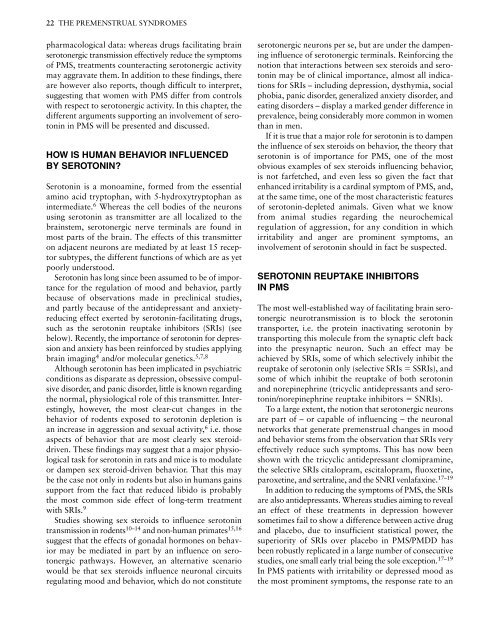Premenstrual Syndromes : PMS and PMDD - Rutuja :: The site ...
Premenstrual Syndromes : PMS and PMDD - Rutuja :: The site ...
Premenstrual Syndromes : PMS and PMDD - Rutuja :: The site ...
Create successful ePaper yourself
Turn your PDF publications into a flip-book with our unique Google optimized e-Paper software.
22 THE PREMENSTRUAL SYNDROMES<br />
pharmacological data: whereas drugs facilitating brain<br />
serotonergic transmission effectively reduce the symptoms<br />
of <strong>PMS</strong>, treatments counteracting serotonergic activity<br />
may aggravate them. In addition to these findings, there<br />
are however also reports, though difficult to interpret,<br />
suggesting that women with <strong>PMS</strong> differ from controls<br />
with respect to serotonergic activity. In this chapter, the<br />
different arguments supporting an involvement of serotonin<br />
in <strong>PMS</strong> will be presented <strong>and</strong> discussed.<br />
HOW IS HUMAN BEHAVIOR INFLUENCED<br />
BY SEROTONIN?<br />
Serotonin is a monoamine, formed from the essential<br />
amino acid tryptophan, with 5-hydroxytryptophan as<br />
intermediate. 6 Whereas the cell bodies of the neurons<br />
using serotonin as transmitter are all localized to the<br />
brainstem, serotonergic nerve terminals are found in<br />
most parts of the brain. <strong>The</strong> effects of this transmitter<br />
on adjacent neurons are mediated by at least 15 receptor<br />
subtypes, the different functions of which are as yet<br />
poorly understood.<br />
Serotonin has long since been assumed to be of importance<br />
for the regulation of mood <strong>and</strong> behavior, partly<br />
because of observations made in preclinical studies,<br />
<strong>and</strong> partly because of the antidepressant <strong>and</strong> anxietyreducing<br />
effect exerted by serotonin-facilitating drugs,<br />
such as the serotonin reuptake inhibitors (SRIs) (see<br />
below). Recently, the importance of serotonin for depression<br />
<strong>and</strong> anxiety has been reinforced by studies applying<br />
brain imaging 4 <strong>and</strong>/or molecular genetics. 5,7,8<br />
Although serotonin has been implicated in psychiatric<br />
conditions as disparate as depression, obsessive compulsive<br />
disorder, <strong>and</strong> panic disorder, little is known regarding<br />
the normal, physiological role of this transmitter. Interestingly,<br />
however, the most clear-cut changes in the<br />
behavior of rodents exposed to serotonin depletion is<br />
an increase in aggression <strong>and</strong> sexual activity, 6 i.e. those<br />
aspects of behavior that are most clearly sex steroiddriven.<br />
<strong>The</strong>se findings may suggest that a major physiological<br />
task for serotonin in rats <strong>and</strong> mice is to modulate<br />
or dampen sex steroid-driven behavior. That this may<br />
be the case not only in rodents but also in humans gains<br />
support from the fact that reduced libido is probably<br />
the most common side effect of long-term treatment<br />
with SRIs. 9<br />
Studies showing sex steroids to influence serotonin<br />
transmission in rodents 10–14 <strong>and</strong> non-human primates 15,16<br />
suggest that the effects of gonadal hormones on behavior<br />
may be mediated in part by an influence on serotonergic<br />
pathways. However, an alternative scenario<br />
would be that sex steroids influence neuronal circuits<br />
regulating mood <strong>and</strong> behavior, which do not constitute<br />
serotonergic neurons per se, but are under the dampening<br />
influence of serotonergic terminals. Reinforcing the<br />
notion that interactions between sex steroids <strong>and</strong> serotonin<br />
may be of clinical importance, almost all indications<br />
for SRIs – including depression, dysthymia, social<br />
phobia, panic disorder, generalized anxiety disorder, <strong>and</strong><br />
eating disorders – display a marked gender difference in<br />
prevalence, being considerably more common in women<br />
than in men.<br />
If it is true that a major role for serotonin is to dampen<br />
the influence of sex steroids on behavior, the theory that<br />
serotonin is of importance for <strong>PMS</strong>, one of the most<br />
obvious examples of sex steroids influencing behavior,<br />
is not farfetched, <strong>and</strong> even less so given the fact that<br />
enhanced irritability is a cardinal symptom of <strong>PMS</strong>, <strong>and</strong>,<br />
at the same time, one of the most characteristic features<br />
of serotonin-depleted animals. Given what we know<br />
from animal studies regarding the neurochemical<br />
regulation of aggression, for any condition in which<br />
irritability <strong>and</strong> anger are prominent symptoms, an<br />
involvement of serotonin should in fact be suspected.<br />
SEROTONIN REUPTAKE INHIBITORS<br />
IN <strong>PMS</strong><br />
<strong>The</strong> most well-established way of facilitating brain serotonergic<br />
neurotransmission is to block the serotonin<br />
transporter, i.e. the protein inactivating serotonin by<br />
transporting this molecule from the synaptic cleft back<br />
into the presynaptic neuron. Such an effect may be<br />
achieved by SRIs, some of which selectively inhibit the<br />
reuptake of serotonin only (selective SRIs � SSRIs), <strong>and</strong><br />
some of which inhibit the reuptake of both serotonin<br />
<strong>and</strong> norepinephrine (tricyclic antidepressants <strong>and</strong> serotonin/norepinephrine<br />
reuptake inhibitors � SNRIs).<br />
To a large extent, the notion that serotonergic neurons<br />
are part of – or capable of influencing – the neuronal<br />
networks that generate premenstrual changes in mood<br />
<strong>and</strong> behavior stems from the observation that SRIs very<br />
effectively reduce such symptoms. This has now been<br />
shown with the tricyclic antidepressant clomipramine,<br />
the selective SRIs citalopram, escitalopram, fluoxetine,<br />
paroxetine, <strong>and</strong> sertraline, <strong>and</strong> the SNRI venlafaxine. 17–19<br />
In addition to reducing the symptoms of <strong>PMS</strong>, the SRIs<br />
are also antidepressants. Whereas studies aiming to reveal<br />
an effect of these treatments in depression however<br />
sometimes fail to show a difference between active drug<br />
<strong>and</strong> placebo, due to insufficient statistical power, the<br />
superiority of SRIs over placebo in <strong>PMS</strong>/<strong>PMDD</strong> has<br />
been robustly replicated in a large number of consecutive<br />
studies, one small early trial being the sole exception. 17–19<br />
In <strong>PMS</strong> patients with irritability or depressed mood as<br />
the most prominent symptoms, the response rate to an


